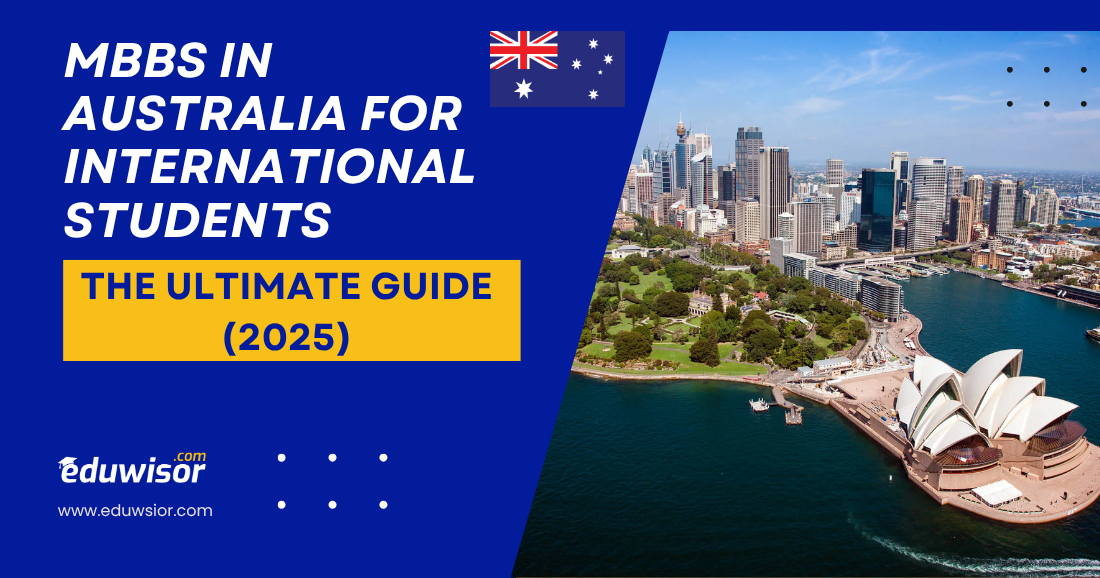Introduction: Why Australia is a Premier Destination for Medical Studies
For ambitious international students seeking world-class medical education, pursuing an MBBS in Australia has become an increasingly popular choice. Australia’s medical schools consistently rank among the global top 50, offering cutting-edge curricula, state-of-the-art research facilities, and unparalleled clinical exposure.
The Australian medical education system produces highly skilled physicians recognized worldwide, with graduates eligible to practice in the UK, US, Canada, and numerous other countries. This comprehensive 2500-word guide will explore every critical aspect of studying medicine in Australia, from top universities and admission requirements to costs, scholarships, and post-graduation opportunities.
Section 1: The Australian Medical Education System Explained
1.1 Understanding the MBBS/MD Structure in Australia
Unlike some countries where MBBS is offered at the undergraduate level, Australia primarily offers:
- Undergraduate Pathway: 5-6 year Bachelor of Medical Science/Doctor of Medicine (MD) programs
- Graduate Pathway: 4-year Doctor of Medicine (MD) for students with prior bachelor’s degrees
1.2 Key Features of Australian Medical Education
- Problem-Based Learning (PBL): Emphasis on case studies and practical application
- Early Clinical Exposure: Hands-on training begins in the first year
- Research Integration: Opportunities to participate in groundbreaking medical research
- Competency-Based Assessment: Focus on developing practical skills
1.3 Accreditation & Recognition
All Australian medical programs are accredited by:
- Australian Medical Council (AMC)
- Recognized by WHO, GMC (UK), ECFMG (USA), and Medical Council of Canada
Section 2: Top 10 Medical MBBS in Australia (2025 Rankings)
| University | QS World Ranking | Program Offered | Duration | Annual Fees (AUD) |
| 1. University of Melbourne | #14 | Doctor of Medicine (MD) | 4 years | $85,000 – $92,000 |
| 2. University of Sydney | #19 | Doctor of Medicine (MD) | 4 years | $80,000 – $88,000 |
| 3. Monash University | #42 | Bachelor of Medical Science/Doctor of Medicine | 5 years | $75,000 – $82,000 |
| 4. University of Queensland | #43 | Doctor of Medicine (MD) | 4 years | $78,000 – $85,000 |
| 5. UNSW Sydney | #45 | Bachelor of Medical Studies/Doctor of Medicine | 6 years | $72,000 – $80,000 |
| 6. University of Western Australia | #72 | Doctor of Medicine (MD) | 4 years | $70,000 – $77,000 |
| 7. Australian National University | #34 | Doctor of Medicine & Surgery (MChD) | 4 years | $82,000 – $90,000 |
| 8. University of Adelaide | #89 | Bachelor of Medicine/Bachelor of Surgery (MBBS) | 6 years | $68,000 – $75,000 |
| 9. Flinders University | #380 | Doctor of Medicine (MD) | 4 years | $65,000 – $72,000 |
| 10. Griffith University | #243 | Doctor of Medicine (MD) | 4 years | $70,000 – $78,000 |
Key Differentiators:
- University of Melbourne: Strongest research focus with 7 affiliated teaching hospitals
- Monash University: Only Victorian university offering direct undergraduate entry
- UNSW: Unique six-year program with rural medicine specialization options
Section 3: Comprehensive Admission Requirements MBBS in Australia
3.1 Academic Eligibility
- Undergraduate Entry: Outstanding high school results (95+ ATAR or equivalent IB/A-level scores)
- Graduate Entry: Completed bachelor’s degree with GPA 5.5+/7.0 (preferably in science)
3.2 Mandatory Entrance Exams
| Exam | Purpose | Score Requirements | Test Centers |
| UCAT | Undergraduate entry | 90th percentile+ | Available worldwide |
| GAMSAT | Graduate entry | 60+ overall (no section <50) | Australia, UK, Ireland |
| MCAT | Alternative for some schools | 500+ | International locations |
3.3 English Language Proficiency
- IELTS: Minimum 7.0 overall (7.0 in each band)
- TOEFL iBT: Minimum 100 (24 in each section)
- PTE Academic: 65 overall (65 in each communicative skill)
3.4 The Interview Process
Australian medical schools use various interview formats:
- MMI (Multiple Mini Interviews): 8-10 stations with different scenarios
- Panel Interviews: Traditional academic/personal questions
- Casper Test: Video-based situational judgment test (required by some universities)
Section 4: Detailed Cost Breakdown (2025 Estimates)
4.1 Tuition Fees Across Different Universities
- Most Expensive: University of Melbourne ($92,000/year)
- Most Affordable: Flinders University ($65,000/year)
4.2 Living Expenses (Annual)
| Expense Category | Cost Range (AUD) |
| Accommodation | $12,000 – $25,000 |
| Food & Groceries | $5,000 – $8,000 |
| Transportation | $1,000 – $3,000 |
| Health Insurance (OSHC) | $600 – $1,200 |
| Study Materials | $1,000 – $2,000 |
| Miscellaneous | $3,000 – $6,000 |
| Total | $22,600 – $45,200 |
- Visa application fee: $710 AUD
- UCAT/GAMSAT exam fees: $300-$500 AUD
- Travel costs for interviews
- Equipment (stethoscope, medical instruments): $500-$1,000
4.3 Hidden Costs to Consider
Section 5: Scholarship Opportunities
5.1 University-Specific Scholarships
- Melbourne Global Health Scholarship – Up to $120,000 over 4 years
- Sydney Scholars India Scholarship – $40,000 for Indian students
- Monash International Merit Scholarship – $10,000/year
5.2 Government Scholarships
- Australia Awards – Full tuition + living allowance
- Endeavour Postgraduate Scholarship – $272,500 for full degree
5.3 External Funding Sources
- Aga Khan Foundation – 50% tuition coverage
- Rotary International – Need-based grants
- Country-specific programs (e.g., Saudi Arabian Cultural Mission)
Section 6: Career Pathways After Graduation MBBS in Australia
6.1 Medical Registration Process
- Complete AMC CAT MCQ Examination
- Undertake 12-month supervised training
- Pass AMC Clinical Examination
- Apply for general registration with AHPRA
6.2 Residency & Specialization Options
- PGY1: Internship year (required)
- PGY2+: Residency training (3-7 years depending on specialty)
- Fellowship: Sub-specialization options
6.3 Salary Expectations
| Career Stage | Average Annual Salary (AUD) |
| Intern | $65,000 – $80,000 |
| Resident | $85,000 – $120,000 |
| General Practitioner | $150,000 – $300,000 |
| Specialist | $200,000 – $500,000+ |
6.4 Global Opportunities
Australian medical graduates can practice in:
✅ United Kingdom (via PLAB exam)
✅ United States (USMLE pathway)
✅ Canada (MCCQE process)
✅ New Zealand (trans-Tasman recognition)
Conclusion: Is MBBS in Australia Right for You?
Pursuing an MBBS in Australia for international students represents a significant investment of time and resources, but offers unparalleled returns in terms of education quality, global recognition, and career prospects. With careful planning around admissions, finances, and career goals, Australian medical degrees can serve as powerful springboards to international medical careers.
Prospective students should:
- Begin preparation 2-3 years in advance
- Carefully research university-specific requirements
- Explore all scholarship opportunities
- Connect with current international students for insights
Next Steps:
- Start preparing for UCAT/GAMSAT
- Begin university shortlisting
- Consult with education advisors
- Attend virtual open days
Eduwisor always guides students toward the right path with an unbiased approach. You can follow us on Youtube, Facebook, Instagram, Twitter, and Linkedin. Stay tuned for regular updates.
Interested in applying? Contact authorized Eduwisor consultant for a smooth admission process!
Act NOW—limited seats for 2025 intake! Call/WhatsApp: 9326395883/ 9076036383



